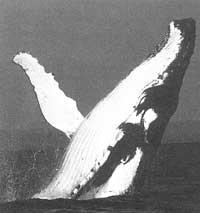Better to listen than to see
So far, whale researchers had to ride ships to conduct their research. The search for whales with binoculars is expensive and, in addition, these mammals only look from the surface, without perceiving anything that happens under water.

However, researchers at Cornell University in New York have developed a device to watch whales but listen to their sounds. The acoustic telescope detects whales more easily and quickly than human vision. The telescope consists of sixteen submarine headphones of 1.6 kilometers in length. Researchers at Cornell University released the apparatus in Southern California behind the underwater boat.
Thanks to this acoustic system, in addition to locating whales, you can count, identify the species and know what is being done depending on the characteristics of the sound performed.
A similar telescope has been used by the U.S. Navy to locate Soviet dives. Whale Researchers want to use this more developed device that will allow you to hear the sounds of the whale from hundreds of kilometers.
Unlike the photo, we do not see many whales, but thanks to the acoustic telescope you can hear their sounds.





